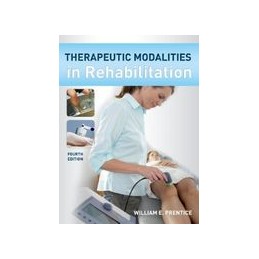- Reduced price

Order to parcel locker

easy pay


 Delivery policy
Delivery policy
Choose Paczkomat Inpost, Orlen Paczka, DHL, DPD or Poczta Polska. Click for more details
 Security policy
Security policy
Pay with a quick bank transfer, payment card or cash on delivery. Click for more details
 Return policy
Return policy
If you are a consumer, you can return the goods within 14 days. Click for more details
Comprehensive Coverage of Therapeutic Modalities Used in a Clinical Setting
A Doodys Core Title for 2015!
Therapeutic Modalities in Rehabilitation is a theoretically based but practically oriented guide to the use of therapeutic modalities for practicing clinicians and their students. It clearly presents the basis for use of each different type of modality and allows clinicians to make their own decision as to which will be the most effective in a given situation. Presented in full color, the text describes various concepts, principles, and theories that are supported by scientific research, factual evidence, and experience of the authors in dealing with various conditions.
The chapters in this text are divided into six parts::
Part I––Foundations of Therapeutic Modalities begins with a chapter that discusses the scientific basis for using therapeutic modalities and classifies the modalities according to the type of energy each uses.. Guidelines for selecting the most appropriate modalities for use in different phases of the healing process are presented.
Part II––Electrical Energy Modalities includes detailed discussions of the principles of electricity, and electrical stimulating currents, iontophoresis, and biofeedback.
Part III––Thermal Energy Modalities discusses those modalities which produce a change in tissue temperatures through conduction including thermotherapy and cryotherapy.
Part IV-Sound Energy Modalities discusses those modalities that utilize acoustic energy to produce a therapeutic effect. These include therapeutic ultrasound and a lesser known modality-extracorporal shockwave therapy.
Part V––Electromagnetic Energy Modalities includes chapters on both the diathermies and low-level laser therapy.
Part VI––Mechanical Energy Modalities includes chapters on traction, intermittent compression and therapeutic massage.
Each chapter ins Parts II-IV discuss:: the physiologic basis for use, clinical applications, specific techniques of application through the use of related laboratory activities, and relevant individual case studies for each therapeutic modality.
Data sheet
